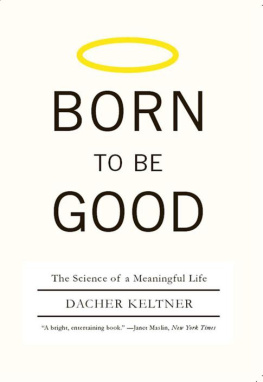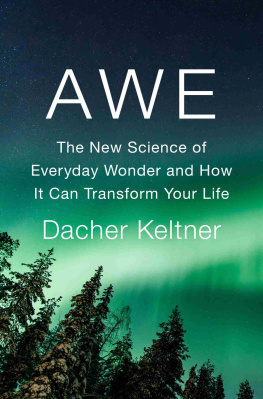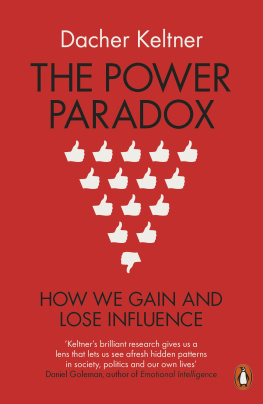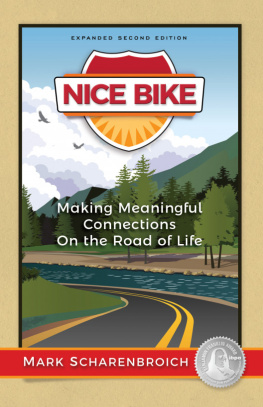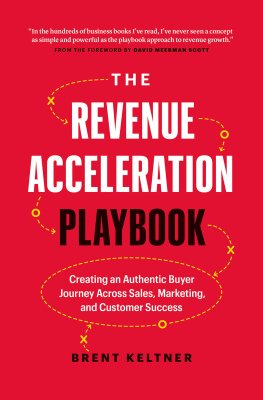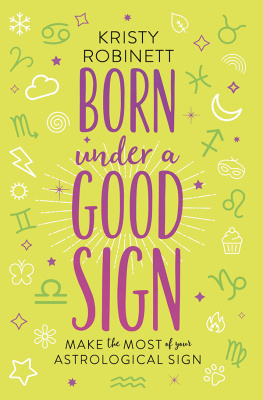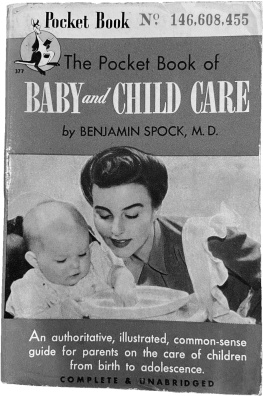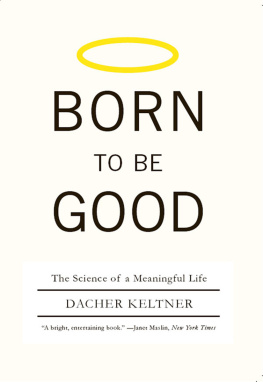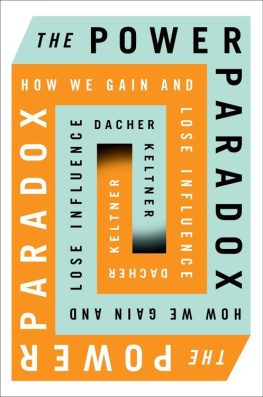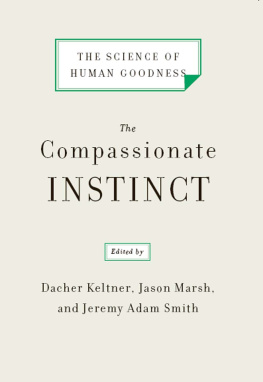Dacher Keltner - Born to Be Good: The Science of a Meaningful Life
Here you can read online Dacher Keltner - Born to Be Good: The Science of a Meaningful Life full text of the book (entire story) in english for free. Download pdf and epub, get meaning, cover and reviews about this ebook. year: 2009, publisher: W.W. Norton & Co., genre: Romance novel. Description of the work, (preface) as well as reviews are available. Best literature library LitArk.com created for fans of good reading and offers a wide selection of genres:
Romance novel
Science fiction
Adventure
Detective
Science
History
Home and family
Prose
Art
Politics
Computer
Non-fiction
Religion
Business
Children
Humor
Choose a favorite category and find really read worthwhile books. Enjoy immersion in the world of imagination, feel the emotions of the characters or learn something new for yourself, make an fascinating discovery.
- Book:Born to Be Good: The Science of a Meaningful Life
- Author:
- Publisher:W.W. Norton & Co.
- Genre:
- Year:2009
- Rating:3 / 5
- Favourites:Add to favourites
- Your mark:
- 60
- 1
- 2
- 3
- 4
- 5
Born to Be Good: The Science of a Meaningful Life: summary, description and annotation
We offer to read an annotation, description, summary or preface (depends on what the author of the book "Born to Be Good: The Science of a Meaningful Life" wrote himself). If you haven't found the necessary information about the book — write in the comments, we will try to find it.
Born to Be Good: The Science of a Meaningful Life — read online for free the complete book (whole text) full work
Below is the text of the book, divided by pages. System saving the place of the last page read, allows you to conveniently read the book "Born to Be Good: The Science of a Meaningful Life" online for free, without having to search again every time where you left off. Put a bookmark, and you can go to the page where you finished reading at any time.
Font size:
Interval:
Bookmark:

W. W. NORTON & COMPANY New York London
Copyright 2009 by Dacher Keltner
All rights reserved
For information about permission to reproduce selections from
this book,
write to Permissions, W. W. Norton & Company, Inc.,
500 Fifth Avenue, New York, NY 10110
Library of Congress Cataloging-in-Publication Data
ISBN: 978-0-393-07335-5
W. W. Norton & Company, Inc.
500 Fifth Avenue, New York, N.Y. 10110
www.wwnorton.com
W. W. Norton & Company Ltd.
Castle House, 75/76 Wells Street, London W1T 3QT
TO THOSE WHO HAVE GIVEN ME SO MUCH JEN :
THE FAMILY WHO RAISED MEJEANIE KELTNER, MY MOTHER;
RICHARD KELTNER, MY FATHER; AND ROLF KELTNER, MY BROTHER
AND THE FAMILY WHO SUSTAINS ME
MOLLIE MCNEIL, MY WIFE; AND NATALIE AND SERAFINA KELTNER
MCNEIL, MY DAUGHTERS.
1
Jen Science
2
Darwins Joys
3
Rational Irrationality
4
Survival of the Kindest
5
Embarrassment
6
Smile
7
Laughter
8
Tease
9
Touch
10
Love
11
Compassion
12
Awe
S OME SCIENTIFIC INSIGHTS arise in powerful, fleeting experiencesa startling observation, a dream, a gut feeling, a sudden realization. My own thinking about human emotion has taken a longer course, reflecting the intersection of the long arc of life and the scientific data I have gathered.
I have been led to the idea that emotion is the source of the meaningful life. My mother, an English professor and student of Romanticism, and my father, an artist guided by Lao Tzu and Zen, cultivated in me the conviction that our best attempts at the good life are found in bursts of passion captured in plot turns in the prose on a page or oil layered on a canvas. This idea proved to have the deepest scientific promise in the hands of Charles Darwin, who believed that brief emotional expressions offer clues to the deep origins of our design, and Paul Ekman, who figured out how to bring quantifiable order to the thousands of movements of the face.
Born to Be Good is the product of my family and scientific upbringings, and attempts answers to three age-old questions. The first is: How can we be happy? Legions of recent empirical studies on happiness have led to best-selling books. We have learned about the difficulties of knowing what makes us happy (Dan Gilberts Stumbling on Happiness ), the importance of optimism (Martin Seligmans Authentic Happiness ), and that, for most of us, relationships are the surest route to happiness, and seeking happiness through financial gain is an illusion (Jonathan Haidts The Happiness Hypothesis ).
Born to Be Good offers a new answer to the question of how we can be happy. In honor of my mother and father, you might call it the Zen Romanticism thesis. The idea is that we have evolved a set of emotions that enable us to lead the meaningful life, emotions such as gratitude, mirth, awe, and compassion (the Romanticism thesis). The key to happiness is to let these emotions arise, to see them fully in oneself and in others, and to train the eye and mind in that practice (the Zen thesis).
Born to Be Good engages a second old question: What are the deep origins of our capacity for kindness? We are witnessing a renewed debate about our origins. Advances in DNA measurement, in archeology, and in the study of our primate relatives are yielding striking new insights into the history of humanity, where we came from, how we dispersed, how we evolved. Embedded in these discoveries is an answer to the question of where our capacity for goodness comes from. Born to Be Good reveals how survival of the kindest may be just as fitting a description of our origins as survival of the fittest.
Finally, Born to Be Good asks: How can we be good? We are in a period of probing moral reflection. U.S. children rank twentieth of twenty-one industrialized countries in terms of social well-being. The moral stature of the United States has fallen dramatically in the past eight years. Deep concerns about genocide, inequality, and global warming raise doubts about whether a hopeful future for the human race is justified on any grounds. There is a hunger for new views of the nature and practice of human goodness. Just look at the crowds that attend every talk by the Dalai Lama.
Born to Be Good reveals a straightforward answer to the question of how to be good: rely on emotions like amusement, gratitude, and compassion to bring the good to others to completion. To give life to this idea, Born to Be Good offers a conversation between Darwinian views of the origins of human goodness (youll be surprised to learn that Darwin believed that sympathy is our strongest passion) and gems from the great traditions of East Asian and Western thought.
The road map of Born to be Good follows the development of my own thinking about answers to these questions. It begins with a discussion, in chapter 1, of the Confucian concept of jen , which refers to kindness, humanity, and reverence. I introduce the concept of the jen ratio, a simple but powerful way of looking upon the relative balance of good and uplifting versus bad and cynical in life. The jen ratio honors my interests in Eastern philosophy and in parsimonious measurement. It is a way to think about the clues to happy marriages, well-adapted children, healthy communities and cultures.
The next three chapters take the reader on a tour of the latest discoveries in evolutionary approaches to emotion. We start in chapter 2 by considering Darwins nuanced analyses of the many positive emotions. Contrary to what many may assume, Darwin believed that these emotions were the basis of our moral instinct and capacity for good. Darwin and Confucius would have been very content collaborators.
From Darwin we travel to New Guinea, and Paul Ekmans paradigm-shifting studies of the universality of facial expression. As a result of the empirical science that followed this work, we have arrived at three new ideas about emotion that are summarized in chapter 3: Emotions are signs of our commitment to others; emotions are encoded into our bodies and brains; emotions are our moral gut, the source of our most important moral intuitions.
In chapter 4 we look back in time to glean what has been learned about the evolution of human goodness. This ever-changing evolutionary science provides a context for understanding the origins of the positive emotions, where the smile comes from, why we are wired to trust and to care. The chapter brings together insights from the study of our close primate relatives, from archeology, and from hunter-gatherer cultures. The reader may be surprised to learn that:
- We are a caretaking species. The profound vulnerability of our offspring rearranged our social organization as well as our nervous system.
- We are a face-to-face species. We are remarkable in our capacity to empathize, to mimic, to mirror.
- Our power hierarchies differ from those of other species; power goes to the most emotionally intelligent.
- We reconcile our conflicts rather than fleeing or killing; we have evolved powerful capacities to forgive.
- We live in complex patterns of fragile monogamy, preferring monogamy but often showing patterns of serial monogamy.
Each of the remaining eight chapters is devoted to the science of different emotions that give rise to high jen ratios. This science is rooted in Darwins deepest insight about human emotion: that the visible expressions of emotion that we observe today are clues to the ancient behaviors that led some mammals to fare well in the tasks of survival, reproduction, and care of offspring. This science would not exist without the methodology Paul Ekman and Wallace Friesen gave to the field: the ability to measure millisecond movements of muscles in the face. Every chapter tries to honor the insights about emotion found in art, literature, and philosophy.
Font size:
Interval:
Bookmark:
Similar books «Born to Be Good: The Science of a Meaningful Life»
Look at similar books to Born to Be Good: The Science of a Meaningful Life. We have selected literature similar in name and meaning in the hope of providing readers with more options to find new, interesting, not yet read works.
Discussion, reviews of the book Born to Be Good: The Science of a Meaningful Life and just readers' own opinions. Leave your comments, write what you think about the work, its meaning or the main characters. Specify what exactly you liked and what you didn't like, and why you think so.

